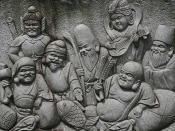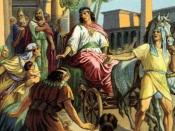The issue of the providence of God has been a point of debate for millennia. Philosophers and Theologians have wrestled with its difficulties and struggled against its points and counter points, ad infinitum. Of the many definitions and interpretation available I am the most at ease with Webster's definition; "providence: God conceived as the power sustaining and guiding human destiny"ÃÂ. With the images of September 11 still vividly recallable one cannot help but grapple with concepts such as the sovereignty of God, free will of mankind, and God's providential hand at work in His creation.
How can God be God if individuals are truly free to make their own choices? As is always the case, my reasoning skills are fundamentally inadequate to bring comfort, so once again I turn to the only source of indisputable truth, the Holy Scripture. Of course there are the words of the Master concerning the fate of the victims of the tower of Siloam disaster (Luke 13:1-5), as well as, the much misunderstood words of Paul in Romans 8:28, and yet I was still left with feelings of incompleteness.
Assured by the knowledge that God's intent was to reveal Himself in His written word I search the Scriptures for a greater understanding of the nature of God and the working of His providence, as it might relate to the affairs of 9/11. It is my belief that even though the circumstances may not be exactly the same we can grasp foundational principles that can be applied to the current predicament. Although in detail different I believe the principles at work in conjunction with the experiences of Joseph, in the book Genesis, might shed light upon the nature of Divine providence. Specifically Genesis 50:19-20: "19 Joseph said to them, "Do not be afraid, for am I in the place of God? 20But as for you, you meant evil against me; but God meant it for good, in order to bring it about as it is this day, to save many people alive. 21 Now therefore, do not be afraid; I will provide for you and your little ones."ÃÂ And he comforted them and spoke kindly to them."ÃÂ This passage might help us better understand how the principles of Divine sovereignty, human freedom and individual responsibility relate to each other. God hates all sin with a perfect and unremitting hatred, yet it is his prerogative to allow good to come out of the evil others devise. No sin can be committed without his knowledge or against His will. In reality, sinners are often just as much the ministers of his providential workings as are his saints.
When Joseph was sold into slavery God's mysterious workings sent him to Egypt, not only to save that pagan nation but also to save the very people who had sold him into those horrible circumstances. As a result, Joseph attained the position his brothers were attempting to undermine, God was glorified, and Joseph was taught to acknowledge and revere God's providence in his circumstances. In addition he taught his brothers to share these same truths. They learned, as we must also, to view God's hand not only in his goodness and mercy to us, but in our afflictions and trials as well.
It is impossible for sinners to reverse the effects of their actions or prevent the natural consequences of sin from producing its wretched effects, but there are countless occasions in which we should give thanks to a gracious God for counteracting and mitigating what would otherwise be the devastating effects of such evil. God can and does work all things for good to those who love him and who are called according to his purposes to be transformed into his Son's image (Rom 8:28"ÃÂ29).
This does not mean that the nature of sin is altered and that believers never experience the pain caused by sin. Poison does not cease to be poison simply because it can sometimes be used medicinally. Based upon the text we can rest assured that God does not need to be concerned that his purposes will be countermanded by society's sinful actions. Nor will God be forced to restrict the freedoms that all individuals have, both believers and unbelievers, in order to safeguard his sovereignty. He is fully capable and successful in all things. God remains God and each individual remain responsible for all his or her acts.
There is both a directive will and a permissive will in the divine purpose. Men and women remain culpable and responsible for an act such as crucifying the Lord of glory, but as a permitted act it can still come under the total plan of God. As Acts 2:23 states; "Him, being delivered by the determined purpose and foreknowledge of God, you have taken by lawless hands, have crucified, and put to death"ÃÂ.
If that is true for Christ's crucifixion, then it is no less true in the case of Joseph and all similarly besieged men and women today. What do you think? Shalom, George




